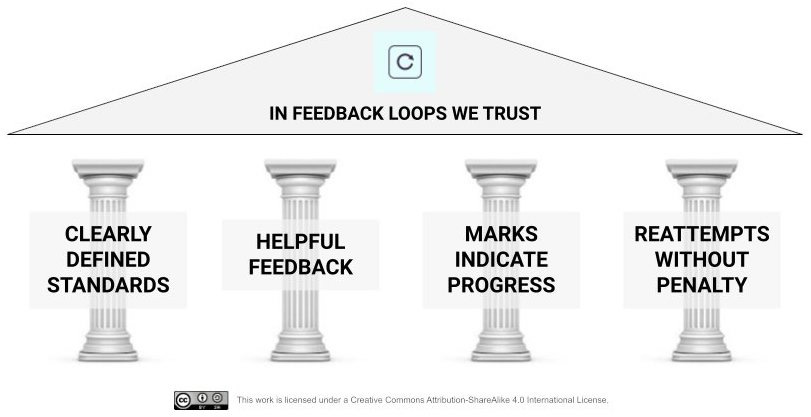Time for reflection
Some useful links for planning better assessments
It’s the end of the semester for us here at Grand Valley State University, so we’re taking a short break.
If you’re just finishing a semester too, now is a perfect time to reflect on your classes. Take a few moments to write some notes to “future you,” perhaps using a Start/Stop/Continue framework. What do you want to start doing in your classes? What needs to be removed? What would you like to change? Most importantly, why? Today’s post includes links to some articles that might help as you think about changing your assessment system for future classes.
Four pillars of alternative assessment
If you’re thinking about converting one of your classes to use some form of alternative grading, you’ll want to think about the four pillars of alternative assessment. This framework can help you think about what matters when designing a feedback loop-based assessment system.
You don’t need to change everything! These pillars can help you identify one or two places to change things up in your own classes. For example: Consider writing and using clear standards, or add reassessments to a key assignment.
Introduction: What are the four pillars and why do they matter?
Pillar 1: How to write standards
Pillar 2: The care and feeding of helpful feedback
Pillar 3: Giving marks that indicate progress
Pillar 4: The heart of the feedback loop: Reattempts without penalty
How do I do that?
If you’d like examples of how to implement the four pillars, check out the case studies we’ve published over the past semester. You don’t need to teach these classes to get concrete ideas of how to use the four pillars. What ideas do you connect with? Which fit your philosophy or context best? Start thinking about how to piece together ideas from these case studies.
Joshua Bowman: Standards-Based Grading (math, small private institution)
Kay C Dee: Specifications Grading (biomedical engineering, upper-level class)
Hubert Muchalski: A hybrid approach (chemistry, mixing SBG, Specs, and a portfolio)
Jennifer Momsen: A very large class (biology, large public research institution, with some ungraded parts)
See you next week, when I’ll take a look at general principles that can guide your decisions when you encounter a new and unexpected situation.




Thanks for putting that CC license on the 4 Pillars image!